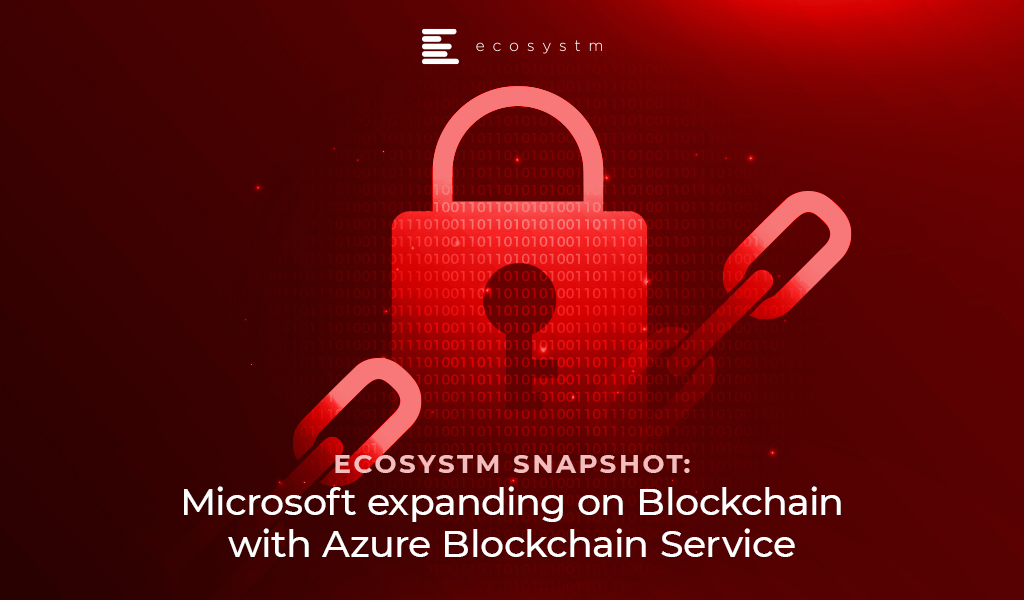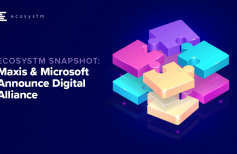
With understanding and acceptance of blockchain increasing, enterprises have started adopting blockchain to store digital records in a secure and auditable manner. In May 2018, we saw Microsoft’s blockchain workbench focused on integrating data and systems and deployment of contracts and blockchain networks. In October 2018, Microsoft Azure joined forces with Nasdaq to integrate blockchain technology into Nasdaq’s framework with an expectancy to speed-up transactions on the stock exchange.
Following these announcements, this month Microsoft unveiled its fully managed Azure Blockchain Service, a package designed to simplify the processes and eliminate the pain points of blockchain networks. Microsoft Azure blockchain service will provide the required infrastructure, connection to services to develop, run and take advantage of applications on its Cloud-based platform.
To leverage blockchain Microsoft and J.P. Morgan announced a partnership to accelerate the adoption of enterprise blockchain. Quorum, an Ethereum-based distributed ledger protocol developed by J.P. Morgan will be the first ledger available through Azure Blockchain Service, on the cloud.
Joining the bandwagon, Starbucks will use Azure and the Ethereum blockchain to track coffee from farm to the cup. In the same way, with a forward-thinking approach, Microsoft and GE Aviation collaborated to bring blockchain into aviation. GE Aviation has built a supply chain track-and-trace blockchain with the help of Microsoft Azure to monitor and collate data in relation to aircraft engine parts, life cycle, when to repair, this technology that the group has come up with is termed as ‘TRUEngine’.
Unfolding blockchain for “regular” businesses and SMEs
Blockchain technology, by its very nature leads itself to the digital transformation journey of an enterprise. Blockchain can address some of the pitfalls of digital transformation such as identity, security, and trust. From digital identity to tokenisation to using smart contracts to automate businesses, blockchain technology is swiftly establishing itself as a key enabler of the emerging digitised enterprise.
 |
Speaking on the subject, Ecosystm’s Principal Advisor, Amit Sharma thinks that “For Small and Mid-Size Enterprise (SMEs), blockchain can simplify and automate processes related to Trade Finance which would mean less paperwork and automation in supply chains and it also opens up a huge alternative finance channel to deal with their cash flow challenges.” |
Overall the blockchain network should facilitate the interworking between IT systems, financial systems and ledgers that are today primarily managed in silos and require heavy manual processes.
Are we already there?
“All disruptive technology has a ‘tipping point’ – the exact moment when it moves from early adopters to widespread acceptance. We are now approaching the tipping point for blockchain. Even though the development of blockchain for business is still in its early stages, business leaders have swiftly moved from understanding blockchain and its potential uses to running pilots,” says Sharma.
Blockchain has attracted attention across industries such as financial services, transportation and shipping, healthcare, energy and utilities, and supply chain management.
These share some common themes. Blockchain is a natural fit for use cases that are transactional but with a high degree of process complexity or volume. Blockchain will become the default technology wherever there is a need to ensure the integrity of data.
Blockchain Adoption by Organisations
Despite the flurry of activity and promising initial developments, blockchain faces a number of obstacles that will need to be overcome before companies choose to adopt it on a broader scale. Its decentralised network runs counter to the current business emphasis on centralising data or functions to support security efforts. Users and operators alike must shift their mindset to embrace and trust the system.“Among blockchain’s selling points is its security: high encryption and protocols. Since the general public largely doesn’t understand how the technology works, many still have concerns with data privacy and cyber security” says Sharma. “As with all new technology, when it comes to blockchain, business leaders should view any initial use cases as part of their enterprise risk management. Executives are attuned to the business and risk implications of blockchain. And in many cases, blockchain, like other technology platforms and systems, can be covered under existing insurance programs.”
Implementation by the large technology providers
“With the large technology providers such as Microsoft and AWS now offering BaaS (Blockchain-as-a-Service) over multiple frameworks supported by a ‘Pay as you use’ model, this technology is much more accessible. Pre-built integrations to the network and infrastructure services that are being offered by some of these players will significantly reduce the development time and cost for enterprise customers” says Sharma.
The next several years could see blockchain move from testbed to becoming an essential business tool, so staying abreast of the latest developments and how it is being used will be critical.






